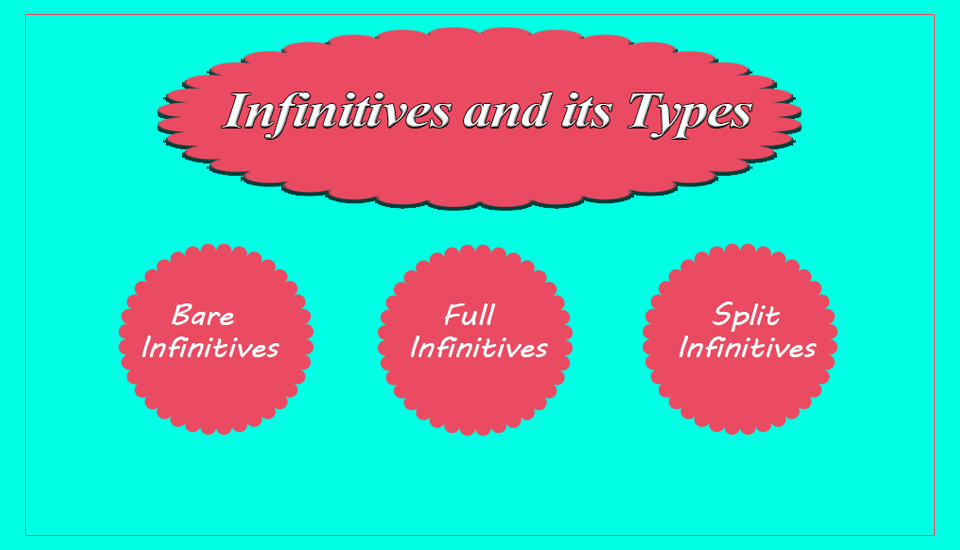The Infinitive is the basic from of the verb. One of the prominent difficulties of the English language is to know whether to use gerund (i.e. seeing) or an infinitive (i.e. to see). If you want to speak correct and natural English you must know about the usages of gerunds and infinitives. In the following lesson we will look at infinitives and its types
Infinitives and its Types

Infinitives:
Definition: The base form of the verb is called infinitive. “OR “the verb without(s, es, ies, ed and d) is called infinitive. (Watch, see, swim, write, teach, play, pray, fix etc.).
Types of Infinitive:
An infinitive can be a to-infinitive or bare infinitive (without to). There is no difference between them. So we can classify them as follow.
1. Bare infinitive
2. Full infinitive
3. Split infinitive
1. Bare infinitive:
The word ‘to’ is frequently used with an infinitive, but when an infinitive is used without ‘to’ it is called bare infinitive.
In English there are certain verbs like (let, have, make, hear, and watch) after which we use bare infinitive.
- Let me play.
- I have my brother clean the room.
- They made me laugh.
- I heard her cry.
- I watched him pray.
The infinitive is used without ‘to’ after modal auxiliaries: will, would, shall, should, can, could, may, might, must, need, dare etc.
- We will win the match.
- I would have invited them.
- We can compete them.
We don’t use after: rather, better and had better the word to with an infinitive.
- You had rather leave earlier.
- We would rather wait.
- I prefer coffee rather than tea.
2. Full Infinitive:
When an infinitive is used with the word ‘to’ or to + infinitive is called full infinitive.
To + infinitive = full infinitive.
Uses of Full Infinitives:
Full infinitives can function as a noun, an adjective or an adverb in a sentence.
A) As Subject
- To call, after all difficulties doesn’t seem worthwhile. (‘To call’ is the action that drives the sentence)
B) Direct Object
- They all want to go. (‘To go’ is the direct object that can be substitute of a noun that receives the action of the verb in the sentence)
C) Subject Complement
- The purpose is to win. (‘To win’ is the subject complement. A Subject complement looks like a direct object, click on the link to read more: Basic Sentence structure)
D) Adjective
- He wasn’t allowed to participate. (‘To participate’ modifies allowed, it describes what type of allowance is being discussed, so the phrase serves as an adjective)
E) Adverb
- He nominated his name in the team to try to practice hard. (‘To try practice hard’ explains why the nominating of his name happened, so it’s an adverb modifying the verb nominated)
Forms of Full Infinitives:
When we use full infinitive we are usually referring to the present infinitive, there are, however, four other form of the full infinitive:
1: The perfect Infinitive (“to have + 3rd of the verb” mostly found in conditional type 3).
- They excused to have played the match.
2: The perfect Continuous Infinitive (“to have been + verb+ ing” is used to express a continuing but now completed action).
- They must have been working for hours.
3: The continuous Infinitive (“to be + verb + ing” is used to express a continuing action after a verb or auxiliary which must be followed by the infinitive).
- You must be kidding.
4: The passive Infinitive (“to be + 3rd of the verb” is used in some constructions using the passive voice. It is particularly common after auxiliary verbs (may, should, could, etc.).
- We are hoping to be given one more chance.
3. Split Infinitives
When you place an adverb or adverbial phrase between the ‘to’ and the verb and split the infinitive from ‘to’ is called split infinitive.
To carefully walk, to boldly go, to seriously play etc.
- The coach urged the players to seriously play and win the match.
- The teacher told us to quickly complete the assignment.
- We are here to persuasively teach infinitives and its types
Using split is condemned in most cases; however, they are common in writing of all kinds. But remember when you are in doubt; avoid using split infinitives in your sentences.
